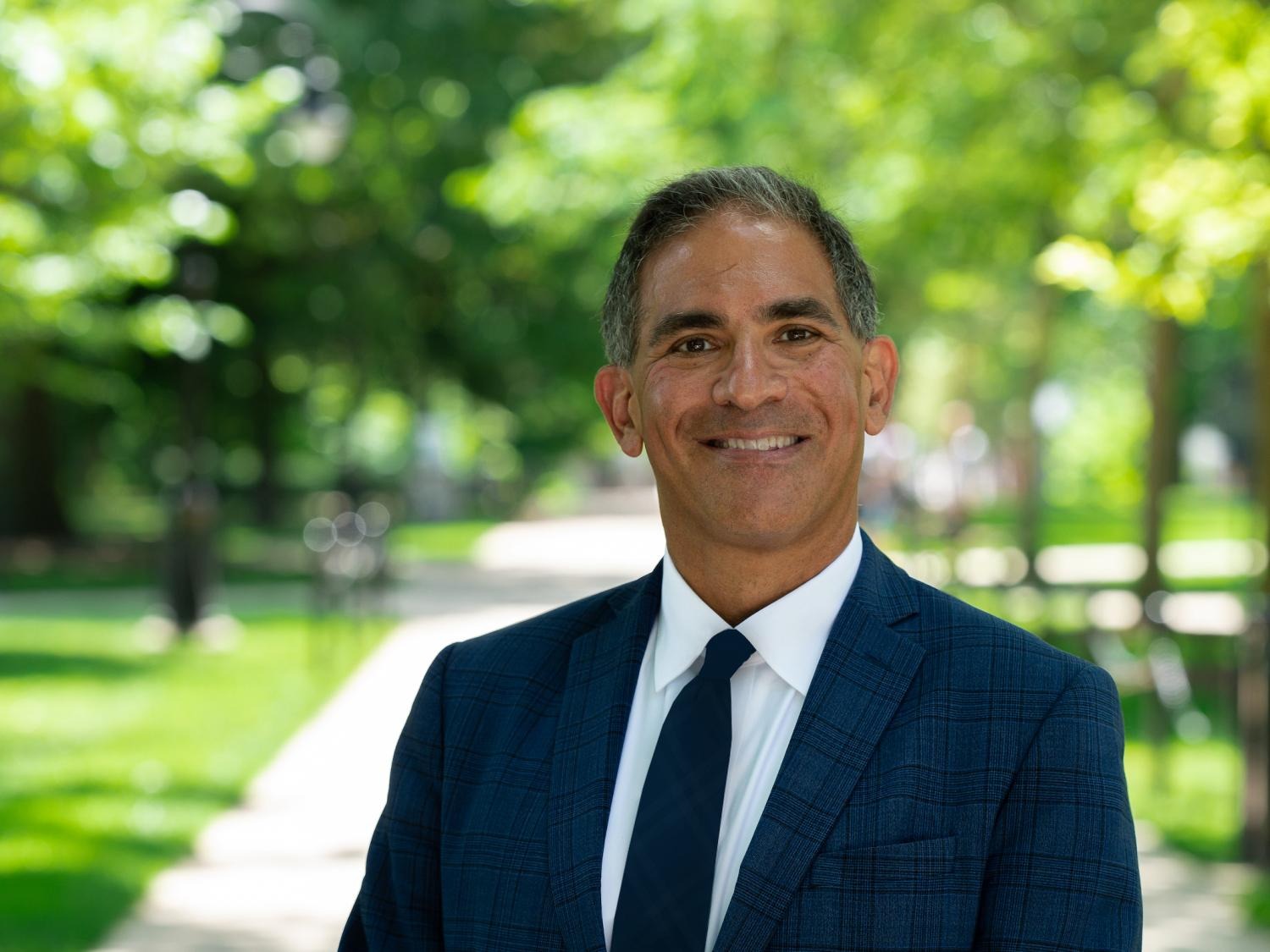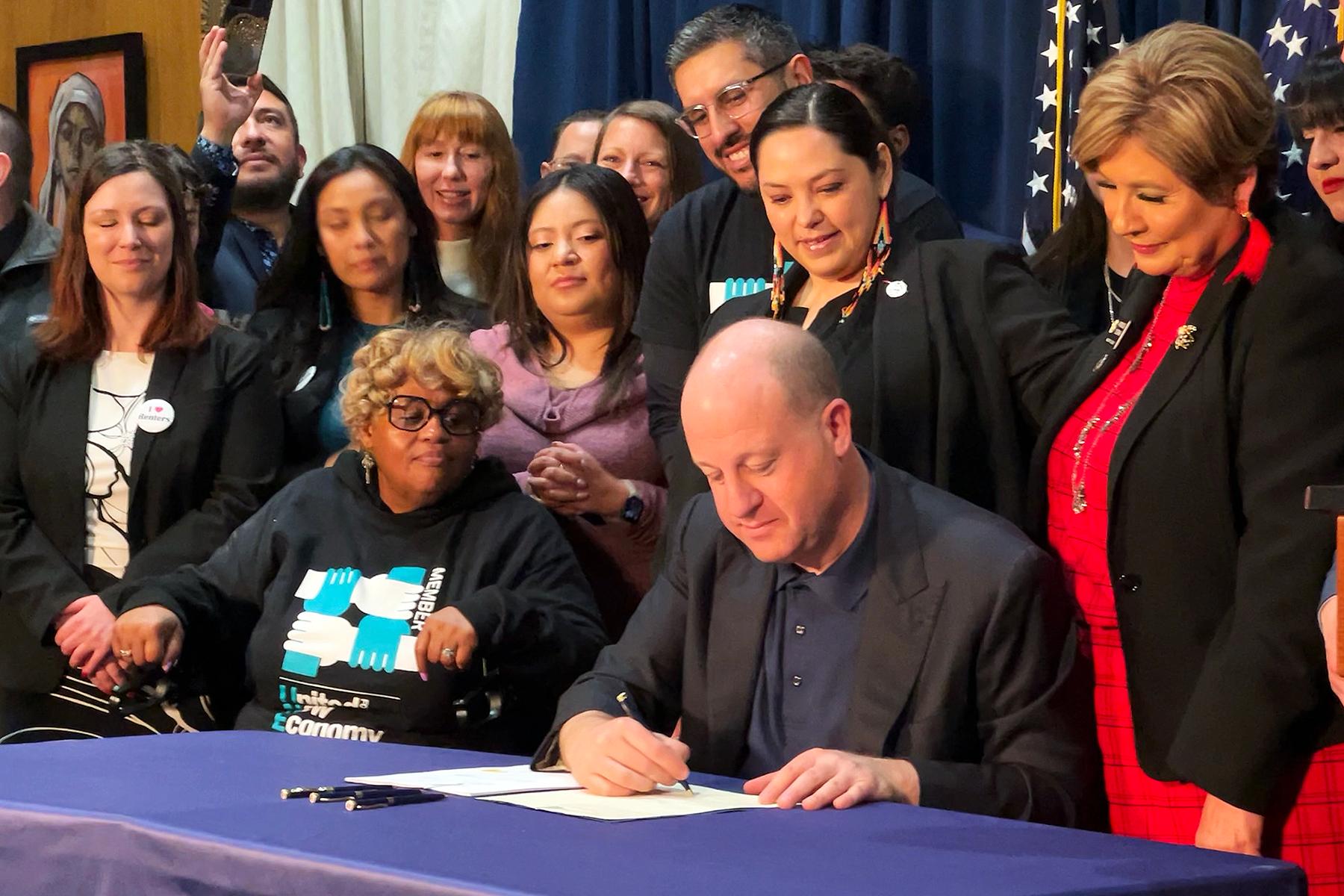A bi-partisan group of state lawmakers is getting together today to work on a major component of the federal health care law. They’re overseeing the creation of a “health insurance exchange,” that’s a new marketplace that’s supposed to increase competition and consumer choice. Colorado businesses are keeping a close eye on the process, wondering whether an exchange will help or hurt them.
CPR Health Reporter Eric Whitney checked in with a couple of Colorado companies to see what they think.
CPR HEALTH REPORTER ERIC WHITNEY: Colorado Equipment is a pretty big business by Colorado standards, it’s got about 200 employees, and what it sells is huge. Chief Financial Officer Jeff Jensen points some out some product on the company’s Colorado Springs lot, just off I-25.
COLORADO EQUIPMENT CHIEF FINANCIAL OFFICER JEFFJENSEN: We just got a new shipment in of new backhoes, over to the right of them, another big loader, to the right of that, an excavator, it’s good for pipeline work.
REPORTER: Of all the things Colorado Equipment buys, Jensen says health insurance the one that consistently costs more every year, as much as 15 to 30% a year more.
JENSEN: A lot of our other costs, clerical supplies, rent, that stuff kinda goes up and down with general inflation. Health care has an inflation rate all it’s own.
REPORTER: That’s in spite of Jensen shopping and bargaining hard every year. His challenge is to get a health plan that not only won’t break the bank, but that’ll provide coverage that meets each employee’s individual needs, from the entry level office worker who’s single, to a senior mechanic making a top salary with a spouse and kids. Jensen says the health insurance exchange the state is trying to set up sounds like it could be a better alternative.
JENSEN: It could be financially advantageous to both the employee and to the employer to drop the coverage and have employees individually go into the exchange.
REPORTER: He likes the idea that his workers could go to the exchange and shop online for the policy that best for them, instead of being stuck with the one size fits all plan he chooses for them every year. And, Jensen says, it looks like most of his workers would qualify for government subsidies to buy health insurance that are supposed to start in 2014. That’s when nearly every American will be required to buy health insurance. The idea is that the requirement to buy insurance will be balanced by subsidies that make it affordable.
JENSEN: Our average mechanic here is making about 55-thousand a year. So let’s say it’s a family of four, making in that 55-thousand a year range, they qualify for those subsidies.
REPORTER: Jensen’s right. The health law actually says that a family of four can make up to about $88,000 a year and still get a subsidy to help it buy health insurance. That’s at the top end, and that family would get a relatively small subsidy. Families making less would get bigger ones.
JENSEN: Now, I haven’t seen how much the subsidies are, so I’m unable to really pencil it down as closely as I would like to, but they’re going to get some subsidy.
REPORTER: Jensen doesn’t know how much the subsidies will be because the federal government hasn’t said yet. And no one knows how much insurance policies offered in the exchange will cost. A lot of that will depend on what kinds of benefits insurance companies will be required to offer, the government hasn’t defined that yet, either.
So at this point, nobody can really say whether a government subsidy will be enough to make health insurance truly affordable.
Now, the federal health law tries to discourage bigger businesses like Jensen’s from dropping employee coverage and sending everybody to subsidized insurance exchanges. He’d be fined about $2,000 per employee if he does. But Jensen says, even with that penalty, his business still might save money by dropping its employee health plan.
Where Jensen is optimistic, the owners of another Colorado business are convinced that exchanges are going to fail.
JB MINIATURES CO-OWNER NANCY RUMFELDT: I don’t see how it could work for business. I think businesses have bought into the fear factor stuff that’s flying out around there, and they’re so afraid of these rising costs that I think that they’re grasping at any solution.
REPORTER: Nancy Rumfeldt owns JB Miniatures with her husband Robert. They manufacture the little buildings and props that model railroaders and war gamers use. The Rumfeldts are Tea Party activists who’ve campaigned against the federal health law, and Colorado’s insurance exchange. They say it’s not government’s job to fix businesses’ health care problems. They think it’s crazy that businesses are supposed to be on the hook for employee health insurance in the first place.
Robert Rumfeldt.
JB MINIATURES CO-OWNER ROBERT RUMFELDT: Our philosophy is to empower the individual.
REPORTER: The Rumfeldts say they use the money they save not buying company health insurance to pay their workers more, and let them shop for insurance on their own.
But even so, they don’t think government should create an exchange for that, and certainly not one with government subsidies.
ROBERT RUMFELDT: Can the country even afford this? And I think the answer to that is no.
REPORTER: The Rumfeldts’ opposition to Colorado’s exchange puts them outside the Colorado business mainstream, or at least outside the state’s most prominent business groups. Those groups helped pass the law that sets up Colorado’s exchange in the legislature last spring.
But there’s still significant conservative opposition to exchanges, especially the government subsidies part.
Jeff Jensen, the tractor dealer, says he can understand that. But he says Americans are already subsidizing businesses health benefits by paying more for goods and services. He says, by his rough estimate, the exchange has the potential to save his company a million dollars a year.
JENSEN: If our costs go down, eventually that is reflected in lower pricing to our customers.
REPORTER: Whether a health insurance exchange will really offer Colorado businesses relief, depends on all kinds of details that the legislative subcommittee starts looking at/started looking at today. The federal government wants states have all those issues worked out, and exchanges up and running by January first, 2014.
A bi-partisan group of state lawmakers is getting together today to work on a major component of the federal health care law. They’re overseeing the creation of a “health insurance exchange,” that’s a new marketplace that’s supposed to increase competition and consumer choice. Colorado businesses are keeping a close eye on the process, wondering whether an exchange will help or hurt them.
CPR Health Reporter Eric Whitney checked in with a couple of Colorado companies to see what they think.
CPR HEALTH REPORTER ERIC WHITNEY: Colorado Equipment is a pretty big business by Colorado standards, it’s got about 200 employees, and what it sells is huge. Chief Financial Officer Jeff Jensen points some out some product on the company’s Colorado Springs lot, just off I-25.
COLORADO EQUIPMENT CHIEF FINANCIAL OFFICER JEFFJENSEN: We just got a new shipment in of new backhoes, over to the right of them, another big loader, to the right of that, an excavator, it’s good for pipeline work.
REPORTER: Of all the things Colorado Equipment buys, Jensen says health insurance the one that consistently costs more every year, as much as 15 to 30% a year more.
JENSEN: A lot of our other costs, clerical supplies, rent, that stuff kinda goes up and down with general inflation. Health care has an inflation rate all it’s own.
REPORTER: That’s in spite of Jensen shopping and bargaining hard every year. His challenge is to get a health plan that not only won’t break the bank, but that’ll provide coverage that meets each employee’s individual needs, from the entry level office worker who’s single, to a senior mechanic making a top salary with a spouse and kids. Jensen says the health insurance exchange the state is trying to set up sounds like it could be a better alternative.
JENSEN: It could be financially advantageous to both the employee and to the employer to drop the coverage and have employees individually go into the exchange.
REPORTER: He likes the idea that his workers could go to the exchange and shop online for the policy that best for them, instead of being stuck with the one size fits all plan he chooses for them every year. And, Jensen says, it looks like most of his workers would qualify for government subsidies to buy health insurance that are supposed to start in 2014. That’s when nearly every American will be required to buy health insurance. The idea is that the requirement to buy insurance will be balanced by subsidies that make it affordable.
JENSEN: Our average mechanic here is making about 55-thousand a year. So let’s say it’s a family of four, making in that 55-thousand a year range, they qualify for those subsidies.
REPORTER: Jensen’s right. The health law actually says that a family of four can make up to about $88,000 a year and still get a subsidy to help it buy health insurance. That’s at the top end, and that family would get a relatively small subsidy. Families making less would get bigger ones.
JENSEN: Now, I haven’t seen how much the subsidies are, so I’m unable to really pencil it down as closely as I would like to, but they’re going to get some subsidy.
REPORTER: Jensen doesn’t know how much the subsidies will be because the federal government hasn’t said yet. And no one knows how much insurance policies offered in the exchange will cost. A lot of that will depend on what kinds of benefits insurance companies will be required to offer, the government hasn’t defined that yet, either.
So at this point, nobody can really say whether a government subsidy will be enough to make health insurance truly affordable.
Now, the federal health law tries to discourage bigger businesses like Jensen’s from dropping employee coverage and sending everybody to subsidized insurance exchanges. He’d be fined about $2,000 per employee if he does. But Jensen says, even with that penalty, his business still might save money by dropping its employee health plan.
Where Jensen is optimistic, the owners of another Colorado business are convinced that exchanges are going to fail.
JB MINIATURES CO-OWNER NANCY RUMFELDT: I don’t see how it could work for business. I think businesses have bought into the fear factor stuff that’s flying out around there, and they’re so afraid of these rising costs that I think that they’re grasping at any solution.
REPORTER: Nancy Rumfeldt owns JB Miniatures with her husband Robert. They manufacture the little buildings and props that model railroaders and war gamers use. The Rumfeldts are Tea Party activists who’ve campaigned against the federal health law, and Colorado’s insurance exchange. They say it’s not government’s job to fix businesses’ health care problems. They think it’s crazy that businesses are supposed to be on the hook for employee health insurance in the first place.
Robert Rumfeldt.
JB MINIATURES CO-OWNER ROBERT RUMFELDT: Our philosophy is to empower the individual.
REPORTER: The Rumfeldts say they use the money they save not buying company health insurance to pay their workers more, and let them shop for insurance on their own.
But even so, they don’t think government should create an exchange for that, and certainly not one with government subsidies.
ROBERT RUMFELDT: Can the country even afford this? And I think the answer to that is no.
REPORTER: The Rumfeldts’ opposition to Colorado’s exchange puts them outside the Colorado business mainstream, or at least outside the state’s most prominent business groups. Those groups helped pass the law that sets up Colorado’s exchange in the legislature last spring.
But there’s still significant conservative opposition to exchanges, especially the government subsidies part.
Jeff Jensen, the tractor dealer, says he can understand that. But he says Americans are already subsidizing businesses health benefits by paying more for goods and services. He says, by his rough estimate, the exchange has the potential to save his company a million dollars a year.
JENSEN: If our costs go down, eventually that is reflected in lower pricing to our customers.
REPORTER: Whether a health insurance exchange will really offer Colorado businesses relief, depends on all kinds of details that the legislative subcommittee starts looking at started looking at today. The federal government wants states have all those issues worked out, and exchanges up and running by January first, 2014.
[Photo: Eric Whitney]









